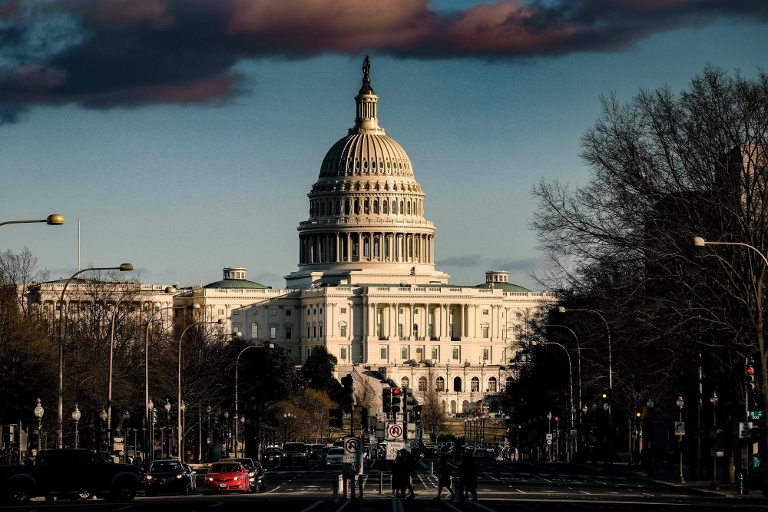Volume 1, June 10, 2019, Issue 7
We really don’t want to talk about it. The Democratic National Committee has rejected Washington Governor Jay Inslee’s call for a primary debate strictly focused on climate change.
“This is deeply disappointing,” Inslee said. “The DNC is silencing the voices of Democratic activists, many of our progressive partner organizations, and nearly half of the Democratic presidential field, who want to debate the existential crisis of our time. Democratic voters say that climate change is their top issue; the Democratic National Committee must listen to the grassroots of the party.”
At least half a dozen Democratic candidates, including Sens. Elizabeth Warren (D-MA) Bernie Sanders (I-VT), Kirsten Gillibrand (D-NY), Michael Bennet (D-CO) and former Obama cabinet official Julián Castro, have backed the idea.
In a statement, the DNC said climate change would remain a top priority during the debates but that it hoped to ensure “vigorous discussion” on all important issues to voters like the economy, climate change, and health care. (Washington Examiner)
It’s unclear why the DNC turned down Inslee’s request. The stated reason appears to me lame given the attention Democrats inside and outside Congress have been focusing on the climate crisis—particularly since Republicans are vulnerable on the issue.
It’s possible that the DNC is worried that participants in such a debate would sound too socialist for the Party’s good.
Denying Inslee’s request is one thing—but the DNC took things a step further. In his announcement of the DNC’s denial of the single-issue debate, Inslee said the organ-ization threatened not to invite him to future debates if he participated in any other climate change debate.
Not content to take “No” for an answer. More than 50 voting members of the Democratic National Committee, who constitute over 10 percent of its voting population, have signed a resolution calling for a 2020 presidential debate focused only on climate change and intend to collect additional signatures for the DNC to consider at a Pittsburgh meeting later this month.
You can’t trust anybody these days. EPA’s Science Advisory Board (SAB) has become a center of controversy as Trump’s administration has sought to remake the federal agencies. Researchers who receive EPA grant money have been barred from serving on the board, while several industry consultants and contrarian scientists have been brought aboard. Although some holdovers remain from previous administrations, Trump-era appointees now make up a large portion of the 44-member body. Some of them are known for their outlying views beyond the prevailing scientific consensus, or for representing the interests of regulated businesses.
Administrator Wheeler vowed to make greater use of the agency’s official board of science advisers. However, soon after he spoke, some of those advisers and other outside experts protested that the agency was instead limiting their role. (Inside Climate News)
What an ungrateful bunch they are. Seventeen major automakers including General Motors, Ford, and Toyota have signed a joint letter urging President Trump to scrap plans to roll back fuel efficiency standards set during the Obama administration.
The companies warned that a rule cutting back on fuel efficiency standards imposed by former President Barack Obama would essentially split the nation’s auto market in half, as companies would be forced to deal with competing efficiency standards imposed by the federal government and some states that have imposed their own standards.
“We strongly believe the best path to preserve good auto jobs and keep new vehicles affordable for more Americans is a final rule supported by all parties — including California,” the letter reportedly read. (The Guardian)
This is what happens when doctrine trumps reason. The White House not only failed to understand what the auto manufacturers had initially asked for—flexibility in meeting the Obama era rules; it doesn’t understand the market well enough to avoid real problems. The tariffs are another example of this. The administration uses its power as a hammer—believing every problem is a nail.
(For a discussion of Trump’s SAFE versus Obama’s CAFE and the various issues involved click (here)
Pipe dreams. The 9th U.S. Circuit Court of Appeals panel ruled in favor of the Trump administration and Trans Canada’s Corp.’s argument to lift an injunction halting construction on the Keystone XL pipeline.The three-judge panel found that the injunction no longer applies because the Trump administration replaced the old permit associated with it in March. (UPI)
Construction is still halted on the pipeline because of injunctions ordered in a similar case in a Nebraska federal court. The project has been tied up in the courts for a decade. Like so many other of the environmental cases the administration has lost, the original decision, in this case, halted construction because of the Trump administration’s efforts to duck under the NEPA law that requires an environmental impact statement.
Tell us what you really think. Representative Paul Tonko (D-NY) said that Trump committed “borderline criminal negligence” in dismissing climate change science during his visit to Europe last week.
“When I saw those quotes, I was just shaking my head in disbelief,” Tonko said. “The way it is phrased is total unawareness. It’s really frightening. It’s tragic when you most need leadership; all you get is denial. The response tells me the president has no idea what he’s talking about.” (Washington Examiner)
It got his Irish up. Representative Tonko was not the only one reacting to Trump’s views on climate change. The Irish president, Michael D Higgins, made an unexpected intervention on the eve of the visit by calling Trump’s policy on the climate emergency “regressive and pernicious,” a critique protesters echoed at rallies in Shannon and Dublin. (The Guardian)
On target for 2020. The Trump administration’s battle for new energy infrastructure will center on Ohio, West Virginia, and Pennsylvania this summer, as members of the president’s cabinet work with state regulators to build the country’s first natural gas and petrochemical hub in Appalachia.
Deputy Energy Secretary Brouillette is working on a major report due as soon as next month that will outline recommendations for speeding development of energy infrastructure. He says most of the Appalachian states are buying into the idea, but the biggest barrier will be in going against the Atlantic Coast states.
Energy Secretary Perry has his own thoughts on the Atlantic Coast states. “When I think a state is blocking a resource that is in America’s national security interest for political reasons, then I think there is a conversation that needs to occur at the federal level,” Perry said. “I think you should have the ability to override a local government’s recalcitrance to allow a national security fuel, a resource, to be transported through your state.” (Washington Examiner)
Finding ways to override state authorities when they conflict with Trump’s positions has become fairly common—especially in environmental regulatory matters in states Trump considers hostile to him. Perry has tried to force FERC to keep uneconomic coal and nuclear plant on-line under the banner of national security. The administration is trying the same thing in the case of auto emissions. There is no attempt made to reconcile the position with traditional Republican efforts to lessen federal controls.
You try breathing this sh*t. The head of the national coal miners’ union urged the Trump administration to impose regulation on silica dust in mines, which researchers believe is responsible for a resurgence of black lung disease in central Appalachia.
The demand from United Mineworkers of America president Cecil Roberts comes as President Donald Trump tries to pump up U.S. coal production, mainly by rolling back regulations he deems burdensome to the industry.
According to Roberts, miners are [now] seeing the most serious levels of black lung, mainly caused by silica, and there are no silica standards out there.
We’re not secure with your saying that. White House officials barred a State Department intelligence agency from submitting written testimony this week to the House Intelligence Committee warning that human-caused climate change is “possibly catastrophic.” The move came after State Department officials refused to excise the document’s references to federal scientific findings on climate change. The references were to the administration’s own Fourth National Climates Assessment.
The effort to edit, and ultimately suppress, the prepared testimony by the State Department’s Bureau of Intelligence and Research comes as the Trump administration is debating how best to challenge the fact that burning fossil fuels is warming the planet and could pose serious risks unless the world makes deep cuts in greenhouse gas emissions over the next decade. Senior military and intelligence officials have continued to warn climate change could undermine America’s national security—a position President Trump rejects. (Washington Post)
Had there ever been a doubt that the White House has decided to make a move on the endangerment finding that led to the government’s regulating greenhouse gas emissions from autos and power plants, this move by the administration should settle the question. Look for a White House controlled “climate panel” to issue a report within the year that says climate science remains unsettled that they will use as the basis for further rollbacks of existing environmental regulations dating back to the Nixon administration.
Call it what it is! Green groups are pressuring networks to call climate change a crisis or emergency. The request is based on a report of Public Citizen report—titled “‘Call It a Crisis’: The Role of U.S. Network News in Communicating the Urgency of Climate Change” (pdf). The report analyzes the coverage of ABC, NBC, CBS, CNN, MSNBC, and Fox News to determine just how much urgency the influential outlets bring to their reporting.
According to David Arkush, managing director of Public Citizen’s Climate Program, the specific words that journalists and news anchors use—or choose not to use—matters.
He puts his money where his mouth is. In a tweet, Michael Bloomberg, the billionaire former mayor of New York City said he would spend $500 million on Beyond Carbon, which he described as “a coordinated campaign to take on the climate crisis.”
“This is the fight of our time,” Bloomberg said in his tweet, where he linked to a New York Times article that details his aims, including shutting down every coal-fired power plant in the US and stopping the growth of natural gas.
Say what? Public support for big government — more regulation, higher taxes, and more social services — has reached the highest level on record in one of the most prominent aggregate surveys of American public opinion.
James Stimson, a political scientist at the University of North Carolina who’s one of the giants of American public opinion research, broke the news in a modest missive to a political science email listserv on June 6. He was sharing the news that the latest edition of Policy Mood, a composite look at American opinion across a range of polls on a range of issues, was available for public release.
“The annual estimate for 2018 is the most liberal ever recorded in the 68-year history of Mood,” he wrote. “Just slightly higher than the previous high point of 1961.”
Society pays the bill–naturally. Political lobbying in the US that helped block the progress of proposed climate regulation a decade ago led to a social cost of $60 billion, according to a new study.
Environmental economists Dr Kyle Meng and Dr Ashwin Rode have produced what they believe is the first attempt to quantify the toll such anti-climate lobbying efforts take on society.
The pair say their work reveals the power firms can have in curtailing government action on climate change, in the face of “overwhelming evidence” that its social benefits outweigh the costs, which range from reduced farming yields to lower GDP. (Inside Climate News)
Lead image: https://unsplash.com/@elevenphotographs






